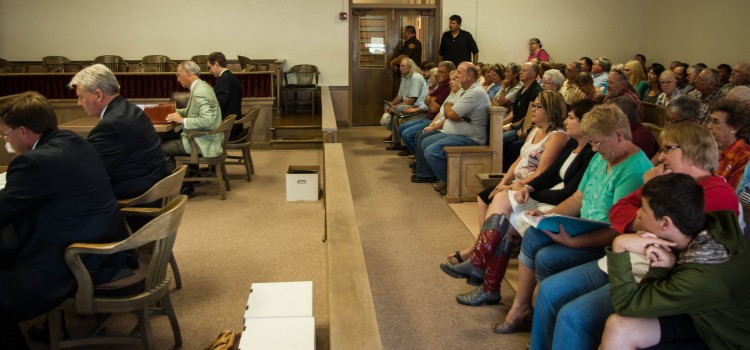

>>Chip in $20 to Support Landowners’ Legal Fight<<
Landowners Opening Brief Filed in Nebraska Keystone XL Battle
Omaha, NE — Lawyers for Nebraska landowners submitted written arguments in Court on Monday, August 31st. They contend a 2012 Nebraska law unconstitutionally authorizes TransCanada, a foreign pipeline company, to use eminent domain and to take their land.
Landowners won temporary injunctions halting eminent domain proceedings in February 2015. The highly publicized Keystone XL Pipeline project has been stalled since then by the Nebraska lawsuits, and a veto by the President of the United States.
If built, the pipeline would dissect Nebraska from north to south.
Briefs were filed on Monday with Holt County District Judge Mark D. Kozisek.
In Nebraska, four members of the State Supreme Court ruled for a landowner group in a previous challenge to strike the law down. But 3 members refused to vote on the merits, resulting in no definitive decision. The Nebraska Constitution requires 5 of 7 Justices must concur to strike down a state law.
That January 2015 action by the State Supreme Court led to the new round of landowner cases. It came as TransCanada started the condemnation process. And it halted TransCanada’s actions.
Since the January ruling, one member of the three-judge group on the Court retired and was replaced by a state District Court judge who ruled for the landowners at the trial court level in the prior lawsuit.
Nebraska lawyers Dave Domina and Brian Jorde wrote the 30 page brief submitted to Judge Kozisek. The case will be heard at O’Neill on October 19th. Domina and Jorde handled the earlier case for landowners as well. That case is Thompson v Heinemann, 289 Neb 798 (2015).
Domina and Jorde argue that LB 1161, passed by the Legislature in 2012, violates Nebraska State Constitutional provisions.
Several prohibitions in the State Constitution are involved. The landowners argue that these include: 1) a requirement the Public Service Commission, not the Governor, must make decisions about common carriers like pipelines; 2) lack of any legal standard for decision making about pipelines; 3) failure to provide a procedure for hearing contests about pipeline applications; 4) lack of judicial review in any appeal process; and 5) a troublesome pledge of a $2 million revolving credit line to the pipeline company to finance its route study.
Domina said, “Our positions are strong. We are eager to be in Court on October 19 for trial, and are optimistic for the legal positions of our Nebraska landowner clients.”
TransCanada and the Nebraska Attorney General have 30 days to respond to the landowners. The landowners will then have the final written word before the October 19 trial in O’Neill.



